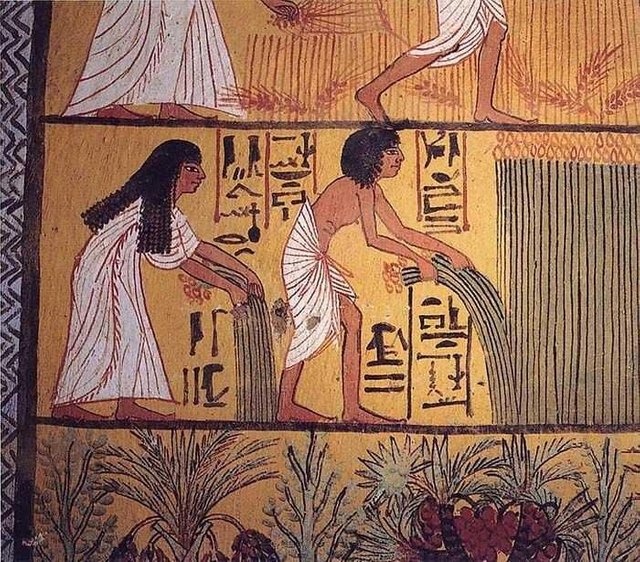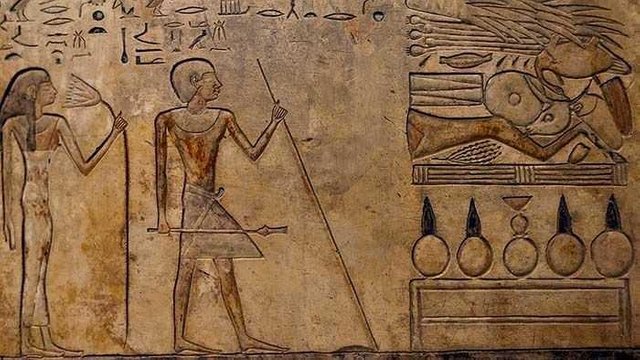The first part of an article on family relations in Egypt can be found here.

Because at the wives of ancient Egyptian culture are considered the same as their husbands, it is important to choose a wife from their circle, close to the spirit and financial well-being. Although men are considered their hosts, and women and children must obey them, women are not humiliated by their husbands.
The sanctity before marriage is not considered important, the ancient Egyptians believed that sex was an integral part of life. Adults can freely pair with each other, and not non-branded legal relationships. It helps the ancient Egyptians to ensure compatibility with spouses in life and reduce the number of divorces.
The Egyptians deeply appreciate women and accept the idea of marriage, regarded love as a major component of the relationship between men and women. Love poems testify to strong feelings and interest in couples who seem unmarried. Today it's hard to say how many families in the pharaoh country have come together for love, but can be confidently affirmed that romantic relationships in the life of the ancient Egyptians were in the first place.
One of the most bizarre secrets in ancient Egyptian civilization is the lack of information about the legalization of the marriage process. Marriage in Ptolemaic Egypt is often accompanied by very fertile parties, but only the wedding ceremonies described by the general public during the reign of the Egyptian pharaoh, and even then not always.
A woman is considered married if she takes her things from her parents' home to an unmarried man.

In ancient records, there is documentary evidence of parents who transferred the property to the bride or groom, but there are no signs of anything resembling a solemn or marriage ceremony.
I do not want to learn - I want to get married
But it remains an open question whether a girl in ancient Egypt is required to have permission to marry, or a loved one can unite easily, only by mutual desire.
Ancient Greeks and Romans, for example, to marry, need the consent of their parents or guardians. The researchers' opinion about the life of ancient Egypt on issues of marriage institutions varied.
For example, an official at Thutmose III's palace was listed on one of the statues (now in the Louvre), he freed his slave and gave him a married nephew, thus allowing the marriage of lovers.
In another story (during XX Dynasty), a noble lady, adopting three children from her own slave girl, allowed her loving younger brother to marry one of her adopted daughters.
In later periods, another incident was described, when the girl's father told her beloved daughter: "The time has not yet come - become a priest, and you will accept him as a wife." The record shows that the couple married a year later. Apparently, there are not so many facts about family participation or guardians in the fate of the newlyweds, two cases described in relation to freed slaves, and one case concerning a little girl. All three stories can be considered exceptions to the rules, not related to ordinary marriage.
"Take a decent husband for your daughter, do not choose it for the rich", as explained by Herodotus's suggestion of the ancient Egyptians, and then show that no one wants to give their daughters in marriage to swineherds. This observation, as a comment, not only talks about the low social status of those caring for pigs, means that the parents of girls have a choice in terms of the election of the groom, and it happens most often in cases where the bride gets married at a young age .
And although it is unknown what the Old, Central and New Royal laws say, when the girl disagreed with the parent's choice of her husband, during the reign of Amnasisa, XXVI of the Pharaoh's Dynasty, the situation became very clear. Newlyweds enter into family relationships only on personal decisions, and parents are only mentioned as their union witnesses.
Later, in the Ptolemaic period, when Greek and Egyptian law exist side by side, we found a large number of documents showing that women with Greek names married only with the permission of the guardian, and the Egyptians continued to marry their own will and decisions.
The institution of marriage without any institution
In ancient Egypt, if a man and a woman who were not married to someone else and had no close family relationship, living together in the same house, they were considered married, without the need for legal registration.
There are also marriage contract with the ancient Egyptians. The Egyptian marriage contract, as a rule, ensures that the ex-wife will not remain poor after the divorce. The treaty was made by the bride's father, and then signed in front of the witness - this is a marriage contract and, as a rule, is the only documentary marriage documentary (without state participation).

Wonderful post....keep giving us such as wonderful content..
Downvoting a post can decrease pending rewards and make it less visible. Common reasons:
Submit
Thanks my friends..
Downvoting a post can decrease pending rewards and make it less visible. Common reasons:
Submit
Congratulations! This post has been upvoted from the communal account, @minnowsupport, by badribireuen from the Minnow Support Project. It's a witness project run by aggroed, ausbitbank, teamsteem, theprophet0, someguy123, neoxian, followbtcnews, and netuoso. The goal is to help Steemit grow by supporting Minnows. Please find us at the Peace, Abundance, and Liberty Network (PALnet) Discord Channel. It's a completely public and open space to all members of the Steemit community who voluntarily choose to be there.
If you would like to delegate to the Minnow Support Project you can do so by clicking on the following links: 50SP, 100SP, 250SP, 500SP, 1000SP, 5000SP.
Be sure to leave at least 50SP undelegated on your account.
Downvoting a post can decrease pending rewards and make it less visible. Common reasons:
Submit